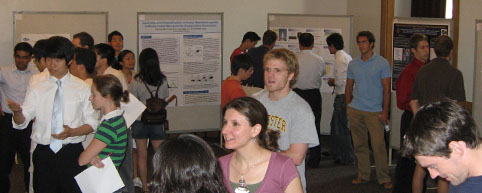Home > Press > INBT Offers Valuable Undergraduate NanoBio Research Opportunity
 |
| Research Experience for Undergraduates poster session 2007. Credit: INBT / JHU |
Abstract:
Undergraduate research experience provides students with lasting benefits. The Johns Hopkins Institute for NanoBioTechnology is pleased to offer a 10-week summer NanoBio research experience for undergraduates (REU) funded by a grant from the National Science Foundation.
INBT Offers Valuable Undergraduate NanoBio Research Opportunity
Baltimore, MD | Posted on January 29th, 2008INBT's NanoBio REU exposes students to lab-based scientific research. Students may opt to work in the research areas of biomaterials, drug/gene delivery, stem cells and cell engineering, nanofabrication, and cancer, among other topics and work side-by-side with INBT affiliated faculty and graduate mentors. They gain hands-on laboratory experience, participate in professional development seminars, and present their results at a final poster session.
In addition, students will earn a $3,500 stipend and an allowance for housing, living expenses, and the cost of travel to and from their homes to Johns Hopkins University. Applications for INBT's NanoBio REU will be accepted until Feb. 15, 2008. Undergraduates who have completed their sophomore or junior year and who are U.S. citizens or permanent residents are eligible to apply.
Studies show that students who took advantage of such opportunities noted "gains in independence, intrinsic motivation to learn, and active participation in courses taken after the summer undergraduate research experience" (Lopatto, 2007). A 2001 survey of 136 liberal arts colleges reported that the number of students participating in undergraduate research has risen by 70% in the last 10 years (Mervis, 2001), while those students seeking more intensive summer research program (such as the one offered by INBT) has increased by 40%.
For more information, go to inbt.jhu.edu/reu. Or contact education program coordinator, Ashanti Edwards, at .
References
Lopatto, David (2007). Undergraduate Research Experiences Support Science Career Decisions and Active Learning. CBE Life Sci Educ 6, 297-306.
Mervis, Jeffrey (31 August 2001). Student Research: What Is It Good For?
Science 293 (5535), 1614. [DOI: 10.1126/science.293.5535.1614]
####
About Institute for NanoBioTechnology
The Institute for NanoBioTechnology at Johns Hopkins University is revolutionizing health care by bringing together internationally renowned expertise in medicine, engineering, the sciences, and public health to create new knowledge and groundbreaking technologies.
INBT programs in research, education, outreach, and technology transfer are designed to foster the next wave of nanobiotechnology innovation.
Approximately 150 faculty are affiliated with INBT and are also members of the following Johns Hopkins institutions: Krieger School of Arts and Sciences, Whiting School of Engineering, School of Medicine, Bloomberg School of Public Health, and Applied Physics Laboratory.
For more information, please click here
Contacts:
Ashanti Edwards
Copyright © Institute for NanoBioTechnology
If you have a comment, please Contact us.Issuers of news releases, not 7th Wave, Inc. or Nanotechnology Now, are solely responsible for the accuracy of the content.
| Related News Press |
News and information
![]() Researchers develop molecular qubits that communicate at telecom frequencies October 3rd, 2025
Researchers develop molecular qubits that communicate at telecom frequencies October 3rd, 2025
![]() Next-generation quantum communication October 3rd, 2025
Next-generation quantum communication October 3rd, 2025
![]() "Nanoreactor" cage uses visible light for catalytic and ultra-selective cross-cycloadditions October 3rd, 2025
"Nanoreactor" cage uses visible light for catalytic and ultra-selective cross-cycloadditions October 3rd, 2025
Academic/Education
![]() Rice University launches Rice Synthetic Biology Institute to improve lives January 12th, 2024
Rice University launches Rice Synthetic Biology Institute to improve lives January 12th, 2024
![]() Multi-institution, $4.6 million NSF grant to fund nanotechnology training September 9th, 2022
Multi-institution, $4.6 million NSF grant to fund nanotechnology training September 9th, 2022
Announcements
![]() Rice membrane extracts lithium from brines with greater speed, less waste October 3rd, 2025
Rice membrane extracts lithium from brines with greater speed, less waste October 3rd, 2025
![]() Researchers develop molecular qubits that communicate at telecom frequencies October 3rd, 2025
Researchers develop molecular qubits that communicate at telecom frequencies October 3rd, 2025
![]() Next-generation quantum communication October 3rd, 2025
Next-generation quantum communication October 3rd, 2025
![]() "Nanoreactor" cage uses visible light for catalytic and ultra-selective cross-cycloadditions October 3rd, 2025
"Nanoreactor" cage uses visible light for catalytic and ultra-selective cross-cycloadditions October 3rd, 2025
Nanobiotechnology
![]() New molecular technology targets tumors and simultaneously silences two ‘undruggable’ cancer genes August 8th, 2025
New molecular technology targets tumors and simultaneously silences two ‘undruggable’ cancer genes August 8th, 2025
![]() New imaging approach transforms study of bacterial biofilms August 8th, 2025
New imaging approach transforms study of bacterial biofilms August 8th, 2025
![]() Ben-Gurion University of the Negev researchers several steps closer to harnessing patient's own T-cells to fight off cancer June 6th, 2025
Ben-Gurion University of the Negev researchers several steps closer to harnessing patient's own T-cells to fight off cancer June 6th, 2025
![]() Electrifying results shed light on graphene foam as a potential material for lab grown cartilage June 6th, 2025
Electrifying results shed light on graphene foam as a potential material for lab grown cartilage June 6th, 2025
|
|
||
|
|
||
| The latest news from around the world, FREE | ||
|
|
||
|
|
||
| Premium Products | ||
|
|
||
|
Only the news you want to read!
Learn More |
||
|
|
||
|
Full-service, expert consulting
Learn More |
||
|
|
||








